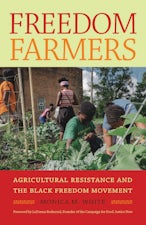Food Power Politics
The Food Story of the Mississippi Civil Rights Movement
By Bobby J. Smith II
216 pp., 6.125 x 9.25, 10 halftones, 2 maps
-
Paperback ISBN: 978-1-4696-7507-7
Published: August 2023 -
E-book PDF ISBN: 979-8-8908-6040-8
Published: August 2023 -
Hardcover ISBN: 978-1-4696-7506-0
Published: August 2023 -
E-book EPUB ISBN: 978-1-4696-7508-4
Published: August 2023
Black Food Justice
Buy this Book
- Paperback $24.95
- Hardcover $99.00
- E-Book $19.99
For Professors:
Free E-Exam Copies
Drawing on multiple disciplines including critical food studies, Black studies, history, sociology, and southern studies, Smith makes critical connections between civil rights activism and present-day food justice activism in Black communities, revealing how power struggles over food empower them to envision Black food futures in which communities have the full autonomy and capacity to imagine, design, create, and sustain a self-sufficient local food system.
About the Author
Bobby J. Smith II is assistant professor of African American studies at the University of Illinois at Urbana-Champaign.
For more information about Bobby J. Smith II, visit
the
Author
Page.
Reviews
"[Smith] shows how the struggles of the region’s Black communities laid the groundwork for the modern food justice movement. Sadly, access to fresh, unprocessed meals still elude many Black Americans today, but this little-known narrative reconstructed by Smith offers key lessons that could inform the current challenges."—Civil Eats
"Explores spaces and places often overlooked by civil rights historians . . . . Smith’s text places into perspective the long history of community organizing, direct action, and educational activism that rural and working-class Black Americans have relied on in the face of economic and social dispossession. Instead of debating the legitimacy of trickle-down activism from hyper-visible politicians and celebrities, Smith reminds us that, historically, political victories and social justice reform sprouts from the bottom up."—Ariel Lawrence, Southern Spaces
"Smith's pathbreaking and interdisciplinary work recovers a food focus that has often been muted in the historical retelling of the movements of the civil rights and Black Power era. Food Power Politics provides a perspective on history, on food justice, and on the fight for civil and human rights that offers important lessons for how we understand food sovereignty."—Monica M. White, University of Wisconsin
"The civil rights movement operated on a series of registers that made it a multilayered and nuanced mass of movements. Here, Bobby Smith II examines the layer providing bodily sustenance and how food, politics, and race operated together. Food was weaponized in modes of oppression but also used to shield and protect communities as an expression of freedom. With four case studies in Mississippi’s civil rights movement, Smith underlines the power of local histories and local people to tell national structural stories while celebrating the resilience of Black folk in the wake of white supremacist tactics to literally starve Black progress."—Françoise N. Hamlin, author of Crossroads at Clarksdale: The Black Freedom Struggle in the Mississippi Delta after World War II




